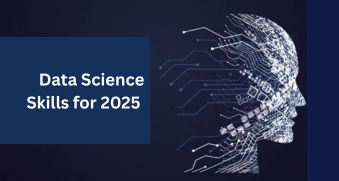Preparing for the Future: Essential Data Science Skills for 2025 and Beyond
Data scientists need to be prepared with sophisticated data science abilities to manage, evaluate, and understand these datasets as data volume and complexity rise.


The need for skilled data scientists is exploding in the fast-changing terrain of technology and data. The data science abilities needed to negotiate the complexity of data science are becoming more advanced as we approach 2025. Hence, a strong educational foundation is becoming more important to enable people to handle these difficulties. Combining knowledge from statistics, computer science, and domain experience, data science is a multidisciplinary field that seeks significant insights from data. Data scientists need to be prepared with sophisticated data science abilities to manage, evaluate, and understand these datasets as data volume and complexity rise.
Furthermore, as data science develops ethical issues and responsible data utilization are becoming more and more important. Many different fields of education understand the value of teaching technically competent and ethically minded data scientists. Businesses are also funding ongoing education initiatives to make sure their staff stays competitive given technical developments.
Advanced Machine Learning and AI
Machine learning and artificial intelligence remain at the core of data science. Future data scientists must go beyond basic algorithms and understand:
- Deep learning frameworks such as TensorFlow and PyTorch.
- Reinforcement learning for decision-making systems.
- Generative AI and large language models (LLMs) like GPT and BERT.
- Explainable AI (XAI) for transparency in model decision-making.
- Federated learning techniques to train models without compromising data privacy.
The integration of AI into edge computing for real-time processing, decision-making, and optimisation of MLOps workflows.
Proficiency in Programming Languages
Python and R will continue to be the dominant programming languages in data science. However, additional skills in:
- Julia for high-performance numerical computing.
- SQL for advanced database querying.
- Scala and Java for big data processing with Apache Spark.
- Rust for memory-safe, high-performance data processing applications.
Data Engineering and Big Data Technologies
Handling massive datasets efficiently will be a crucial skill. Data scientists should be proficient in:
- Apache Hadoop and Spark for big data processing.
- Cloud platforms like AWS, Google Cloud, and Azure.
- Data pipeline frameworks such as Apache Airflow and Kafka.
- NoSQL databases like MongoDB and Cassandra for flexible data storage solutions.
- Real-time analytics tools such as Apache Flink and Druid to process streaming data effectively.
Cloud Computing and MLOps
- Deploying machine learning models using AWS SageMaker, Google Vertex AI, or Azure ML.
- CI/CD pipelines for model deployment and monitoring.
- Kubernetes and Docker for containerization and scaling.
- Model interpretability and monitoring frameworks to ensure long-term performance.
- Automating model retraining and version control for better adaptability to dynamic data changes.
With ongoing research in quantum computing, future advancements can influence data engineering by unlocking new approaches to complex data processing and optimisation.
Ethical AI and Data Privacy
- Fairness, accountability, and transparency in AI.
- Data privacy regulations like GDPR and CCPA.
- Bias mitigation techniques in machine learning models.
- Differential privacy and synthetic data generation to protect sensitive information.
- The role of AI governance in ensuring responsible deployment of data-driven solutions.
Domain Knowledge and Business Acumen
- Become knowledgeable in certain sectors such e-commerce, finance, or healthcare.
- Work on your narrative and communication abilities to convert ideas into corporate influence.
- Work with cross-functional teams to provide solutions grounded on data.
- Knowing behavioral economics and decision sciences can help one create models fit for consumer behavior and corporate goals.
- Learn product analytics to help close the gap between business strategy and data science.
Quantum Computing and Advanced Analytics
- Quantum algorithms for optimization and cryptography.
- Frameworks like Qiskit and Cirq for quantum computing.
- The potential impact of quantum machine learning on AI advancements.
- Hybrid quantum-classical computing techniques to enhance traditional ML models.
- Applications of quantum computing in complex simulations, financial modeling, and drug discovery.
Conclusion


CATEGORIES
- MBA Program
- Data Science and Analytics
- Cloud Computing
- Data Analytics and Business Intelligence
- AI and Digital Systems
- Cyber Security and Digital Forensics
- Business Analytics & Intelligence
- Banking & Financial Services
- International Business
- Digital Marketing
- Research Paper
- Media & Entertainment
- Media Management
- Journalism and Media Production
- Media & Information Technology
- Visual Communication
- Game Development
- Sound Engineering
- Game Art & Design
- Photography
- Film Making
- Animation & VFX
Are you aspiring to become a proficient Data Science and Analytics professional?
Look no further; we are committed to nurturing the potential of young minds. Are you ready to enhance your skills?


